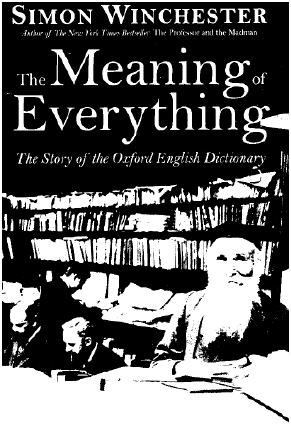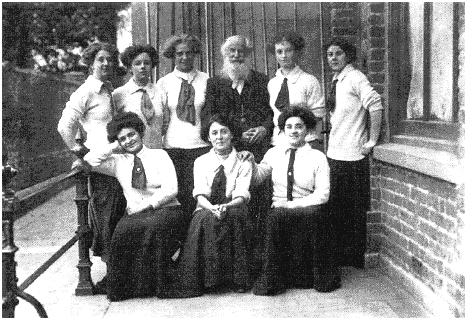Of Everything
Oxford English
Dictionary
Simon Winchester
(Oxford)

You can find the incursion of French represented amiably and well in the Canterbury Tales. If being an English Major did little for my life, especially in the way of employment, it was able to make me fall out of love with mathematics and fall in love with Chaucer --- a love that continues to this day, especially when I am in my cups, mounting the mead-hall table to recite one of his poems (such as the one I append as an afterthought to this review).
The early years were consumed with agony and backbiting. The Philological Society of London thought up the project, and the first editor, Herbert Coleridge turned pale and died after a year on the job. Some time after, the greatest editor of them all, James Murray, drove everyone to distraction by moving ever ... so ... slowly. He decided to publish the dictionary in bits and pieces, the first (A - Ant) with over 8000 words, came out twenty-seven years after work had commenced.
Samuel Johnson set the stage for the OED, for the editors wanted not only all English words included --- and the emphasis is on all --- but that they would be defined and then illustrated with copious quotes. The final 12 volume OED, completed in 1928, carried slightly over 400,000 words, but was illustrated with some 2,000,000 quotes.
Oh the characters that worked on it over the years! Frederick Furnivall, an early editor, loved sculling and pretty young women --- so that during his time of service, he created a Ladies' Sculling Club in West London [See Fig 2 below]. Then there were Murray's funny hats, great white beard, and eleven children (all employed in the project at some time in their lives).
One of the thousands of contributors, Fritzeward Hall, spoke nine languages and "wrote every single day ... with sheet after sheet of proofs, corrected, changed, closely read and carefully parsed." William Chester Minor was a murderer working from his cell at Broadmoor Asylum for the Criminally Insane. (Winchester recently published a book on Minor, called The Professor and the Madman.)
There is J. R. R. Tolkien, employed in 1919 --- mostly concentrating on "W" (warm, wasp, water, wick, wallop, waggle, winter). He said that the time he worked on the OED he learned more "than any other equal period of my life." In one of the many delightful footnotes to The Meaning of Everything, we are told that Tolkien "found sufficient evidence for the existence of the strange expression the right to wallop one's own nigger to prepare a slip for it: but his seniors at the Dictionary thought it too offensive (and insufficiently illustrative) and so did not use it."
The other contributors? Well, there are many, but some that Winchester (and we) like the best are Hereward Thimbleby Price, Father Henry Rope, Lawrenceson Fitzroy Powell, Gustavus Adolphus Schrumpf, and George Washington Salisbury Friedrichsen. Not all people involved were that enamored of the OED. A Mrs. A. Caland who lived in Holland said that she could not tolerate her husband continuing work on "that wretched dictionary."
The words? The worst, according to Murray, was set. Also marzipan. Black was a bother, taking one assistant three months to work out.
The very last word in the 1928 edition? I thought you'd never ask: zyxt. A Kentish word, past participle of the verb to see. Is it possible that there are people out there who do Scrabble using only the OED?
The letters? J was a "lexicograph bloodbath" and Q was "an absolute dog." S was the fattest --- taking up two volumes in the final edition. Such suffering for a sempiternal series of segmented, seamless series of sounds, cited by so many scriveners under but one seraskier (F. séraskier. --- Turk, chief of the army).
To those of us who wonder about our current and generally dim-witted world, where published writing is usually created by congenital idiots, the joy here is in the literate world of Victorian England, the finding of so many passionate volunteers who, over the years, worked on their own, sent in millions of quotes.
The completed project took fifty-four years, 160,000 pages, £300,000. But, you know, the English Language, like tax-collectors and telemarketers, never sleeps. There have been supplements coming out ever since 1928, the most recent one in which they have set the whole in computerspeak so that changes can easily be intersticed over the next thousand years.
Who would ever believe that the writing of a dictionary could be such a page-turner? It's not only the characters; it's not only the brief (but excellent) history of the English language; it's not only the history of previous dictionaries, including Samuel Johnson's (When one lady complained that there were no obscenities in his dictionary, he replied, "Madam, I hope I have not daubed my fingers. I find, however, that you have been looking for them.")
No, rather, it is the author's ability to pluck so many droll facts about it and the people involved that keeps us going. As the OED bogs down, the reader finds himself urging these eccentric characters to get on with it, to somehow get through E, and M, and S --- get it over with, get done with it, be done. With a project that will never be done.

Winchester speaks of "the sheer beauty and staggering accomplishment of his poetry and prose."
He tells us how the English men and women of the fourteenth century spoke to one another; he tells us how they cursed and complained and questioned and told each other jokes; he ranged in his interests from the highest-flown kind of rhetoric to the most banal of domestic chit-chat. It is the quantity, the breadth, and the assortment of his writings that elevate him above all others of his time.
Of our times, too, we may add. This is from the "Knight's Tale."
Naught may the woful spirit in myn herte
Declare o poynt of alle my sorwes smerte
To yow, my lady, that I love most;
But I biquethe the service of my gost
To yow aboven every creature,
Sin that my lyf may no lenger dure.
Allas, the wo! allas, the peynes stronge,
That I for yow have suffred, and so longe!
Allas, the deeth! allas, myn Emelye
Allas, departing of our companye!
Allas, myn hertes quene! allas, my wyf
Myn hertes lady, endere of my lyf!
What is this world? what asketh men to have
Now with his love, now in his colde grave
Allone, with-outen any companye.
Far-wel, my swete fo! myn Emelye
And softe tak me in your armes tweye,
For love of God, and herkneth what I seye.And this is my translation:
Ay lady --- the one that I love the most:
The woeful spirit that lies in my heart
Can't tell you of my most painful sorrows.
But I bequeath to you the service
Of my ghost, above every creature,
Since my life may last no longer.
Alas the woe, alas the pain that I
For you have suffered, and for so long.
Alas the death. Alas, my Emily.
Alas, departing from our companionship.
Alas, my heart's queen; alas, my wife ---
My hearts lady, the dearest of my life!What is this world? What does it ask one to have?
Now with his love; now, alone, in the cold grave,
Without any company.
Farewell, my sweet love, my Emily,
Softly take me in your arms, for love of God,
And listen to what I have to say.I tell you, the twenty-two words, "What is this world? what asketh men to have / Now with his love, now in his colde grave / Allone, with-outen any companye," are some of the most gorgeous ever composed in the English language.